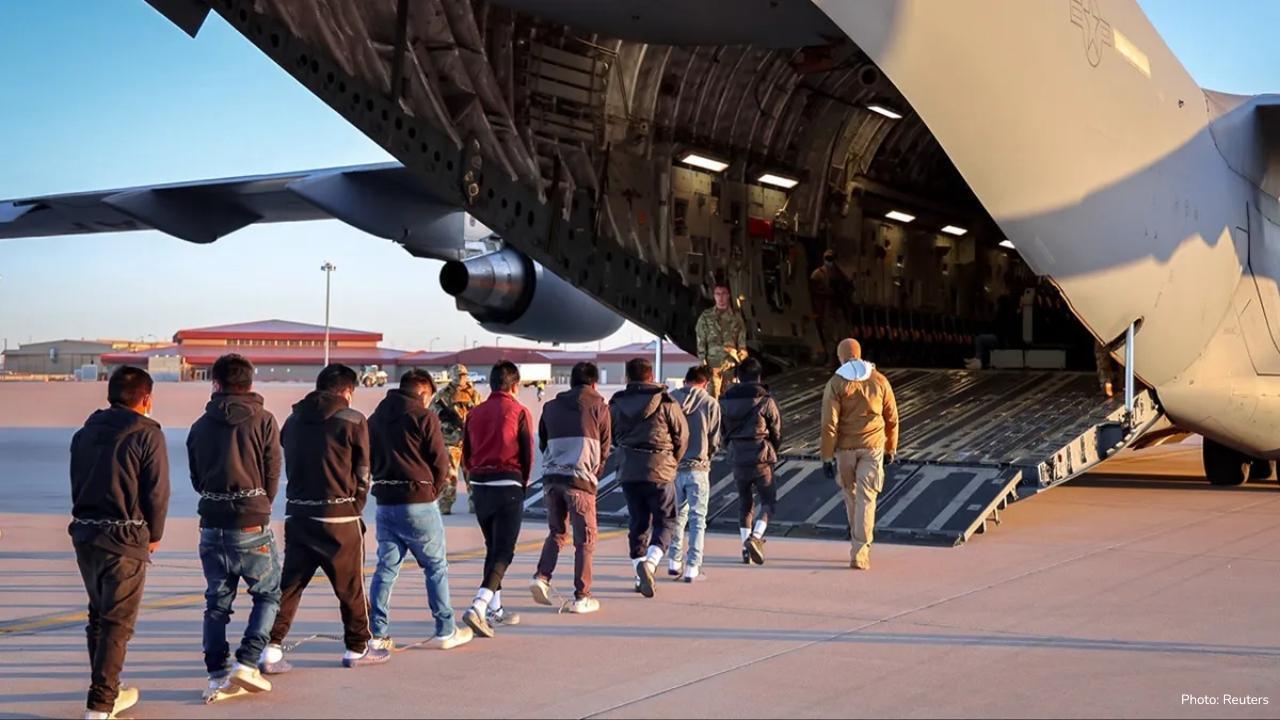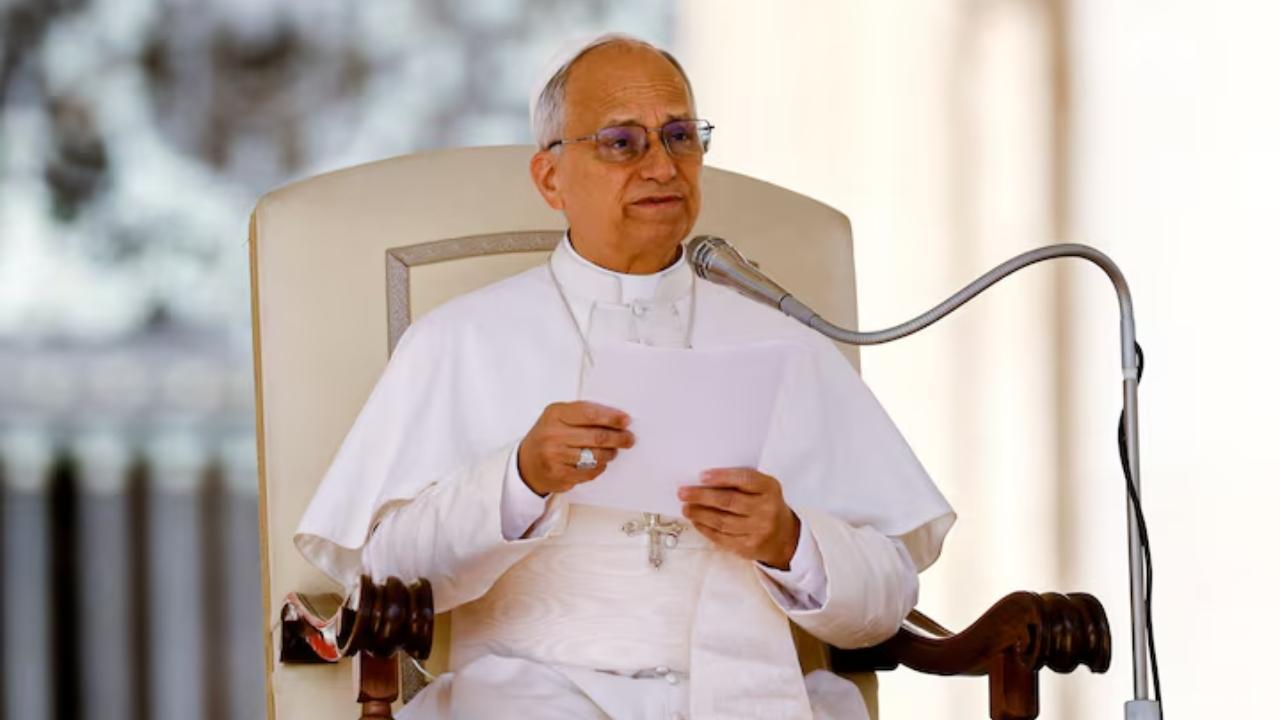
Post by : Monika
Hamas, the Palestinian group that controls the Gaza Strip, is now carefully thinking about how to respond to a new peace plan offered by the United States. U.S. President Donald Trump has given the group only three to four days to make a decision. Trump has warned that if Hamas refuses the plan, there could be “a very sad end,” signaling the seriousness of the situation.
The peace plan aims to end the long-standing conflict between Hamas and Israel, which has lasted for more than two years. The plan is detailed and has 20 points, covering issues such as ceasefire, prisoner exchange, and disarmament. Although it is promoted as a chance for peace, Hamas has not been directly involved in creating it, and some of its leaders see the proposal as biased in favor of Israel.
On Monday, the plan was shared with Hamas by Qatar and Egypt. Both countries have played a role in mediating between Israel and Hamas in the past. These nations hope that the plan can lead to a reduction in violence and bring stability to Gaza, where civilians have been severely affected by ongoing conflict.
Israeli Prime Minister Benjamin Netanyahu met President Trump at the White House and expressed strong support for the plan. Netanyahu said the proposal reflects Israel’s main goals and is a step toward long-term peace. Trump also emphasized that this plan could finally stop the fighting that has caused immense suffering in Gaza, including deaths, injuries, and destruction of homes and infrastructure.
Details of the Plan
The peace plan has several major points. First, it calls for an immediate stop to fighting between Israel and Hamas. This is essential because the fighting has led to many civilian casualties on both sides. Second, it proposes a full exchange of prisoners. Hamas would release the hostages it holds, and in return, Israel would release Palestinian prisoners from its jails. This has been a long-standing demand from both sides, but it is also a sensitive issue because each side fears being tricked or pressured.
Another major point in the plan is that Israel would gradually withdraw from Gaza. In addition, the plan asks Hamas to disarm. This has always been a major point of disagreement because Hamas considers its weapons necessary for defending Palestinians against Israel. The plan also suggests forming a temporary government in Gaza led by an international body, which could supervise the region and help with rebuilding and maintaining security.
Some Hamas officials have already called the plan “unfair” to Palestinians. They argue that it imposes too many conditions on Gaza while not giving enough benefits or rights to the Palestinian people.
Many parts of the plan are similar to earlier ceasefire proposals, which were sometimes accepted by Hamas and Israel but later failed. Hamas leaders have said that they will study the plan carefully before making a decision, but they remain cautious about agreeing to disarmament or other conditions that could weaken their control.
Hamas’ Concerns
Hamas has made it clear in the past that it will not give up its weapons, even if it is willing to negotiate administrative control in Gaza. One of the group’s main points is that Israel must fully leave Gaza before any release of hostages. Hamas also wants to ensure that any agreement respects the rights of Palestinians living in Gaza and elsewhere.
A senior Palestinian official described Trump’s plan as one that “meets Israel’s demands but does not give real rights to Palestinians.” The official said that although international mediators like Qatar and Egypt are trying to find a compromise, the plan is still heavily weighted in favor of Israel.
Hamas, therefore, faces a difficult choice: accept the plan and risk losing its weapons and influence, or reject it and continue the conflict, knowing that the international community and some Arab countries support the proposal.
International Pressure
Hamas is under pressure from several sources. Leaders from Saudi Arabia, Jordan, the United Arab Emirates, Qatar, and Egypt have welcomed the U.S.-led peace plan. Their support adds to the pressure on Hamas to respond quickly. At the same time, Turkey, which has traditionally supported Hamas politically and financially, is monitoring the situation closely.
Qatar, Egypt, and Turkey are holding talks in Doha to discuss the plan and try to coordinate a response. It is not clear whether Hamas will attend these meetings. In the past, meetings to discuss U.S. proposals have sometimes been dangerous. For example, the last time Hamas met to discuss a U.S. plan in Qatar, Israel had attempted to strike Hamas leaders with a missile attack, though it failed. This history makes Hamas cautious about participating in talks openly.
The Role of Hostages
A key part of the peace plan involves hostages. Hamas currently holds some Israeli citizens, and Israel holds Palestinian prisoners. The proposed exchange of prisoners is complicated because both sides fear giving away leverage or appearing weak. For Palestinians, the release of prisoners is a symbol of justice, while for Israelis, the release of hostages is a top priority for safety and national pride. This makes any agreement very sensitive, and Hamas has to consider carefully whether the exchange is fair and safe.
Ceasefire and Security
Stopping the fighting immediately is another major demand of the plan. Gaza has been under attack and blockade for many years, and both civilians and fighters have suffered. Hospitals, schools, and homes have been damaged or destroyed, leaving thousands of people without proper shelter or medical care. The plan suggests a temporary international government to supervise Gaza. This body would ensure security, help rebuild infrastructure, and manage daily governance. Hamas is skeptical of giving full control to an external authority but may agree to partial administrative supervision if it can maintain influence over security.
Economic and Humanitarian Factors
Gaza faces extreme humanitarian challenges, including shortages of food, electricity, and clean water. The peace plan promises international support to rebuild the region. If Hamas accepts the plan, it could lead to foreign aid, reconstruction of homes and schools, and improved living conditions. However, Hamas leaders are worried that disarming could leave them vulnerable to future attacks by Israel, which makes them hesitant to accept the plan immediately.
Possible Outcomes
If Hamas rejects the plan, Trump has warned that the consequences could be severe, hinting at possible military actions or stricter sanctions. If Hamas accepts, it could lead to a temporary peace, prisoner exchanges, and international supervision of Gaza. However, even if an agreement is reached, it may not solve all underlying issues between Israel and Palestine. Past ceasefires have broken down, and distrust between the two sides remains high.
Experts say that the next few days are critical. Hamas must weigh the risks and benefits carefully. Accepting the plan could bring short-term relief and aid to Gaza, but it could also weaken Hamas’ influence. Rejecting it could result in continued fighting and international criticism. The decision is complicated by the expectations of other Arab nations, the U.S., and Israel.
Historical Context
Hamas has ruled Gaza since 2007 after winning elections and defeating the rival Palestinian group Fatah in a brief civil conflict. Since then, Israel has imposed strict blockades and occasional military strikes in response to rocket attacks and security threats from Hamas. Over the years, various international attempts have been made to mediate peace, but they have usually failed because of disagreements over territory, disarmament, and mutual distrust.
Trump’s current plan is different because it comes with clear deadlines and international backing. It also directly involves Israel’s support, which is a major factor in its potential effectiveness. However, the plan is criticized by some as one-sided and heavily in favor of Israel, which makes Hamas cautious.
What Happens Next
In the coming days, Hamas will hold internal discussions to decide whether to accept or reject the plan. Leaders will meet with advisors and possibly consult other Palestinian factions. Qatar, Egypt, and Turkey will continue to mediate and may organize further meetings. Meanwhile, Israel and the U.S. are watching closely, ready to act depending on Hamas’ response.
The people of Gaza are also anxious. Civilians hope for peace but fear that rejecting the plan could lead to more violence. Schools, hospitals, and markets in Gaza have suffered during previous conflicts, and many families are waiting for a chance to rebuild their lives safely.
Hamas is at a critical moment. The U.S.-led peace plan offers a chance to end years of fighting, rebuild Gaza, and improve living conditions. However, it also asks Hamas to make major concessions, including giving up weapons and agreeing to international supervision.
Hamas must make a careful choice in just a few days. The world is watching closely, hoping for a solution that can bring lasting peace to Gaza and Israel while protecting the rights and safety of civilians.
The next few days are likely to be decisive for Hamas, Gaza, and the wider region. International diplomats, local leaders, and ordinary people are all waiting to see whether Hamas will accept the plan or continue the conflict. Either choice will have significant consequences, not only for the people living in Gaza but also for the stability of the entire Middle East.
Hamas Gaza Strip U.S. Peace Plan










Gaza Aid Flotilla Faces Unidentified Vessels, Enhances Security
Global Sumud Flotilla reports unlit boats approaching, prompting increased safety measures as they d

U.S. Reduces Military Role in Iraq, Shifts Focus to Syria
The U.S. is scaling back its military presence in Iraq, transferring security responsibilities to th

US Deports 100 Iranians in Deal with Tehran
The US has deported 100 Iranians back to Iran after a deal with Tehran. This marks a rare cooperatio

Pope Leo Hopes Hamas Will Accept Trump's Gaza Peace Plan
Pope Leo expresses hope that Hamas will accept Trump's 20-point Gaza peace plan, urging respect for

Italy Ends Navy Support for Gaza Aid Flotilla Amid Tensions
Italy withdraws naval escort for Gaza-bound aid flotilla, citing risks of Israeli interception. Acti

Yemen's Houthis Sanction U.S. Oil Firms Amid Tensions
Yemen's Houthis impose sanctions on U.S. oil giants like ExxonMobil and Chevron, raising concerns ab